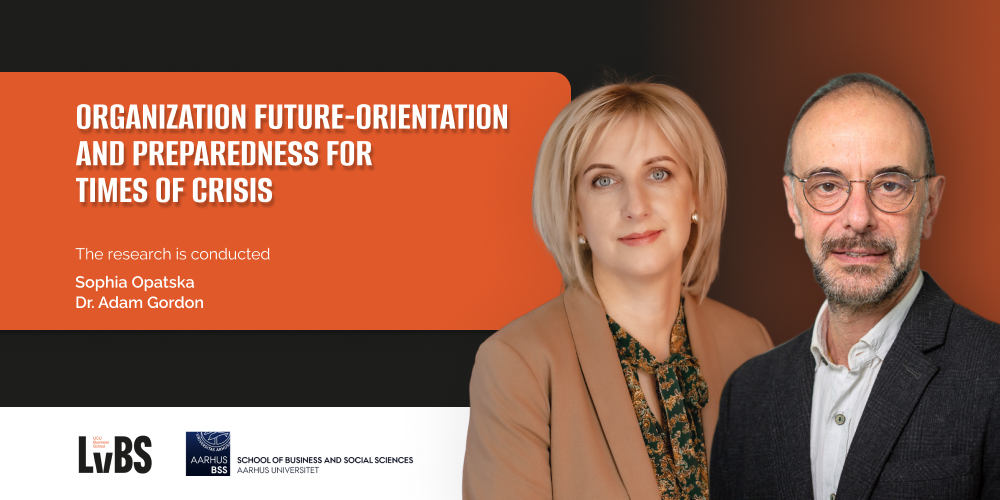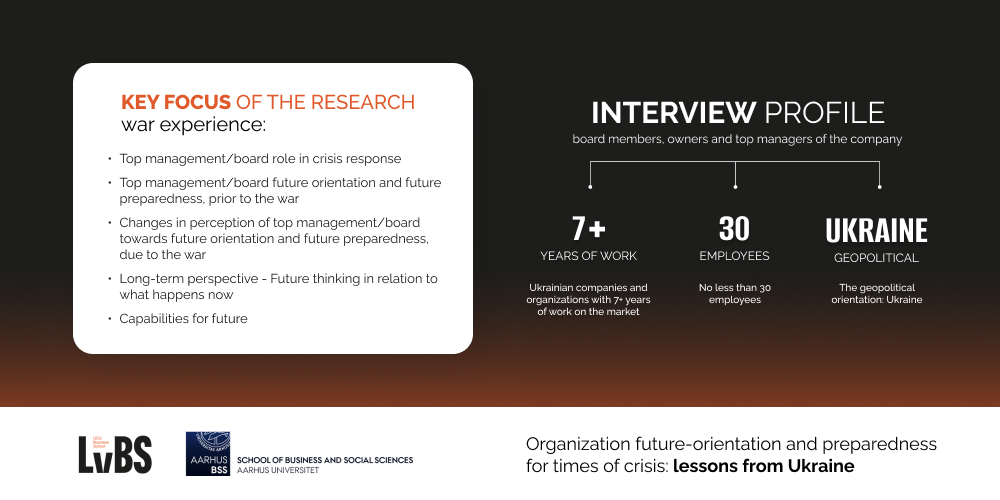UCU Business School with the Aarhus University School of Business and Social Sciences are conducting a study aimed to examine Ukrainian companies in readiness to cope with destructive effects of war . The research is conducted by Founding Dean of UCU Business School Sophia Opatska and Associate Professor in the Aarhus BSS OSA Strategic Foresight Research Network Dr. Adam Gordon.

What companies can do to establish and maintain organizational forward orientation and future-preparedness? What are the practices that help Ukrainian private and public companies to go through geopolitical and contextual challenges? The research aims to find how Ukrainian business leaders are approaching these questions and document emerging solutions.
The main goal of the research is to find out what practices Ukrainian private and state-owned companies use during war to go through geopolitical and contextual challenges. One of the objectives is to investigate how well boards of directors and top managers were involved in contingency planning and how they acted in critical situations.The result of research is a generalization of the best practices and procedures to use them in future.
Strategic future-preparedness is more than risk management: it is equally oriented to the opportunities that external change presents. It is best understood as a leadership capability: to assess signals and events and apply a suite of sensemaking and probing tools to them, to build a higher-quality view of plausible future industry circumstances that lie beyond any ability to predict or control, and use this to improve strategic decision making today.
The source of the research is executive directors or board members, top managers of reputable Ukrainian companies and organizations (with 7+ years of experience in the market), both private and public companies, social impact projects and companies with at least 30 employees (or employees and contractors for IT companies and social impact projects).

The surveys revealed a number of adaptations – in both practices and perceptions – among Ukrainian business managers, and translation of this into strategic responses, as follows:
- Crisis management: to date, much of Ukrainian business remains in crisis or survival mode, with attendant focus on employee physical and mental welfare, maintaining employment, and company cashflow.
- Reorientation to the war effort: a significant re-orientation of business services to the war effort is evidenced in many sectors.
- Business and the social contract: a majority of the interviewed companies had participated in volunteer and donor programs. A connection between the business purpose and future-building of the country is very apparent.
- Discovering resilience: companies that have adapted to the changed circumstances report a new management confidence and optimism based on their newfound proven adaptability, resilience, and speed and efficiency of (successful) decision-making.
- New opportunities, nationally: company managers are looking forward to business opportunities in sectors that they expect to grow strongly when recovery and rebuilding starts (particularly construction and construction supply; energy, information technology, and agriculture.)
- New opportunities, globally: firms have an entirely different global outlook based on (a) considerable international recognition, sympathy and current wartime engagement, and (b) a widely expanded Ukrainian «diaspora». Many respondents are looking to access export markets, relocate production, open offices abroad and pursue international mergers and acquisitions.
- «Grand Reset», sustainability and beyond: with much of the economy to be rebuilt, a greater strategic rethink is in evidence, particularly rebuilding for sustainable production, and pursuing higher-value products (e.g. exporting food products rather than raw grain.)
Flexibility is an important element to strategic thinking in such disruptive times and a number of respondents mentioned scenario planning as an important element of strategic thinking. The companies started to gradually look back at their company strategy. Despite a dramatic change of context before invasion strategies fully or to a high extent made sense. Some are talking more about development plans rather than strategy with a shorter period of time in the focus. Especially from organizations whose operations mostly focused on Ukrainian customers.
More can be read in the presentation materials delivered during The 9th Israel Strategy Conference, 18-20 December 2022.
https://mgmt.au.dk/unesco-chair-in-anticipatory-leadership-and-futures-capabilities
For more information please contact:
Sophia Opatska: sopatska@ucu.edu.ua
Adam Vigdor Gordon: adg@mgmt.au.dk





















